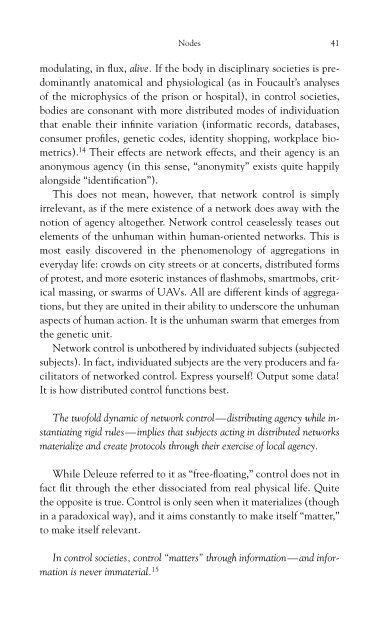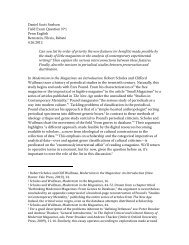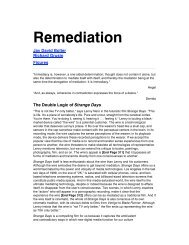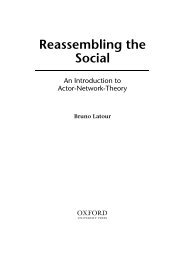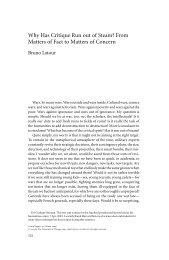The Exploit: A Theory of Networks - asounder
The Exploit: A Theory of Networks - asounder
The Exploit: A Theory of Networks - asounder
Create successful ePaper yourself
Turn your PDF publications into a flip-book with our unique Google optimized e-Paper software.
Nodes 41<br />
modulating, in flux, alive. If the body in disciplinary societies is predominantly<br />
anatomical and physiological (as in Foucault’s analyses<br />
<strong>of</strong> the microphysics <strong>of</strong> the prison or hospital), in control societies,<br />
bodies are consonant with more distributed modes <strong>of</strong> individuation<br />
that enable their infinite variation (informatic records, databases,<br />
consumer pr<strong>of</strong>iles, genetic codes, identity shopping, workplace biometrics).<br />
14 <strong>The</strong>ir effects are network effects, and their agency is an<br />
anonymous agency (in this sense, “anonymity” exists quite happily<br />
alongside “identification”).<br />
This does not mean, however, that network control is simply<br />
irrele vant, as if the mere existence <strong>of</strong> a network does away with the<br />
notion <strong>of</strong> agency altogether. Network control ceaselessly teases out<br />
elements <strong>of</strong> the unhuman within human - oriented networks. This is<br />
most easily discovered in the phenomenology <strong>of</strong> aggregations in<br />
everyday life: crowds on city streets or at concerts, distributed forms<br />
<strong>of</strong> protest, and more esoteric instances <strong>of</strong> flashmobs, smartmobs, critical<br />
massing, or swarms <strong>of</strong> UAVs. All are different kinds <strong>of</strong> aggregations,<br />
but they are united in their ability to underscore the unhuman<br />
aspects <strong>of</strong> human action. It is the unhuman swarm that emerges from<br />
the genetic unit.<br />
Network control is unbothered by individuated subjects (subjected<br />
subjects). In fact, individuated subjects are the very producers and facilitators<br />
<strong>of</strong> networked control. Express yourself! Output some data!<br />
It is how distributed control functions best.<br />
<strong>The</strong> tw<strong>of</strong>old dynamic <strong>of</strong> network control—distributing agency while in -<br />
stantiating rigid rules—implies that subjects acting in distributed networks<br />
materialize and create protocols through their exercise <strong>of</strong> local agency.<br />
While Deleuze referred to it as “free- floating,” control does not in<br />
fact flit through the ether dissociated from real physical life. Quite<br />
the opposite is true. Control is only seen when it materializes (though<br />
in a paradoxical way), and it aims constantly to make itself “matter,”<br />
to make itself relevant.<br />
In control societies, control “matters” through information—and information<br />
is never immaterial. 15


